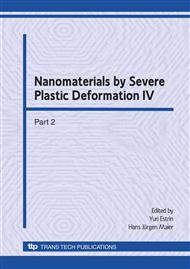p.227
p.231
p.237
p.243
p.249
p.255
p.263
p.269
p.275
In Situ Tensile Testing of Ultra Fine Grained Pd and Pd-Ag Alloys
Abstract:
In situ tensile tests were conducted on ultra fine grained (UFG) pure Pd and Pd-x% Ag (x=20, 60) alloys of different stacking fault energies (SFEs) with the aim to study the general features of the deformation process of UFG materials as well as the peculiarities brought by the alloying. Grey scale correlation analysis (GSCA) was used to determine the true strain as well as the surface flow within the gauge length. It was shown that the largest values of strength and uniform elongation were obtained in Pd-20% Ag alloy. The GSCA revealed different macroscopic flow processes in this sample as compared with pure Pd and Pd-60% Ag alloy. In particular, pure Pd and Pd-60% Ag alloy demonstrated rapid localization of plastic flow in the neck area, whereas Pd-20% Ag samples showed a large contribution of homogenous deformation even after neck formation. It has been proposed that larger strain hardening capacity of Pd-20% Ag alloy is related to its lower SFE as compared with that of pure Pd: the lower is the SFE, the more difficult is the cross slip and climb of split dislocations, which leads to enhanced dislocation storage and, ultimately, to increased strain hardening. At the same time, further decrease of SFE in Pd-60% Ag sample leads to development of deformation twinning and consequent reduction of strain hardening. The dimpled structure of fracture surfaces in the samples will also be discussed in relationship to these findings.
Info:
Periodical:
Pages:
249-254
Citation:
Online since:
June 2008
Authors:
Price:
Сopyright:
© 2008 Trans Tech Publications Ltd. All Rights Reserved
Share:
Citation:


